Parliamentary Committees are essential for managing the extensive workload of the Indian Parliament, operating under the guidance of the Speaker/Chairman and supported by the respective Secretariats. Originating from British parliamentary practices and formalized through the Montford Reforms, these committees derive their authority from Articles 105 and 118 of the Indian Constitution. They are categorized into Standing Committees, which are permanent, and Ad hoc Committees, which are temporary and task-specific.
Overview of the Structure and Functioning of Parliamentary Committees in India
The Role and Authority of Parliamentary Committees in India
- Parliamentary Committees: The Parliament has limited time to consider all legislative and other matters, which is why much of its business is conducted through committees, namely Parliamentary Committees.
- Operation and Reporting of Parliamentary Committees: These committees, appointed, elected, or nominated by the House, operate under the direction of the Speaker/Chairman, and their reports are presented to the House or the Speaker/Chairman and the Secretariat, provided by the Lok Sabha/Rajya Sabha Secretariat.
- Origin and Authority: The concept of Parliamentary committees originated in the British Parliament and in India it can be traced back to Montford Reforms. In the Indian Constitution these committees draws their authority from:
- Article 105: Powers, privileges, etc., of the houses of Parliament and of the members and committees thereof.
- Article 118: Each House of Parliament may make rules for regulations, subject to the provisions of this constitution, its procedure and the conduct of its business.
- There are two types of Parliamentary Committees: Standing Committees and Ad hoc Committees.
- Standing Committees are permanent and regularly constituted, while Ad hoc Committees are appointed for specific purposes and dissolved once their task is completed.
- Ministers generally are not allowed to be a member in most of the committees such as in Financial Committees, Departmentally Related Standing Committees, Committee on Subordinate legislation, Committee on Welfare, etc.
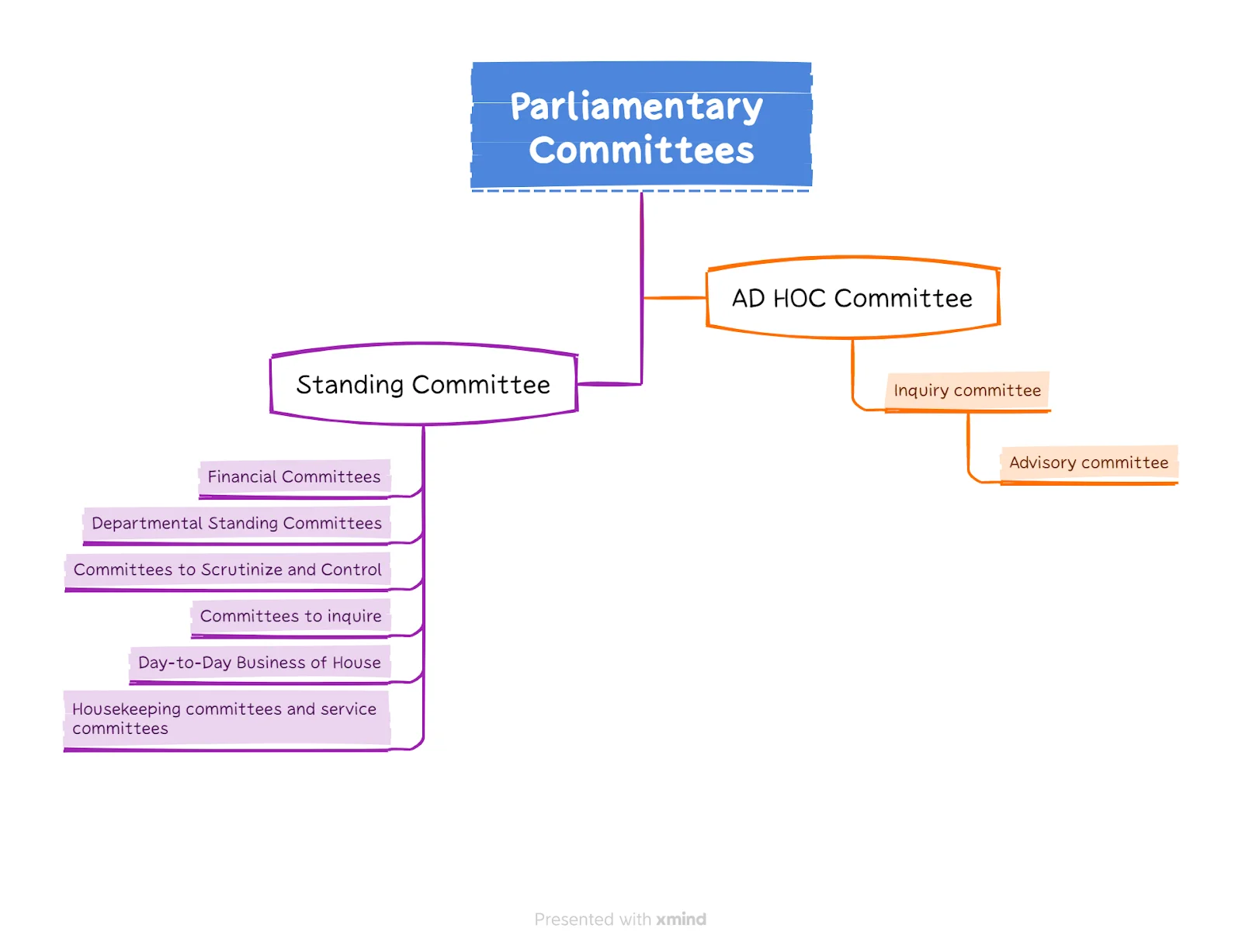
Enroll now for UPSC Online Course
List of Parliamentary Committees
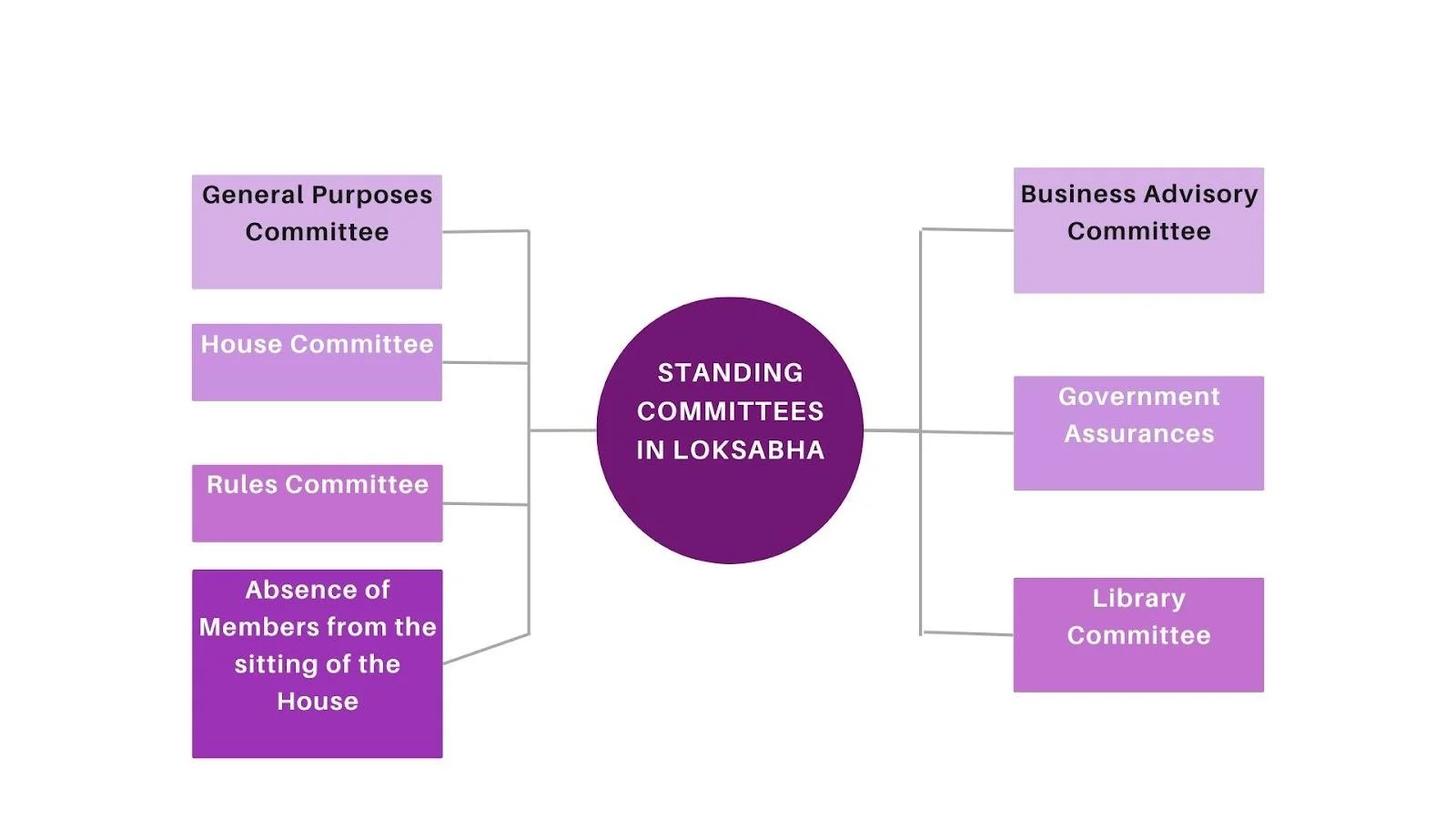
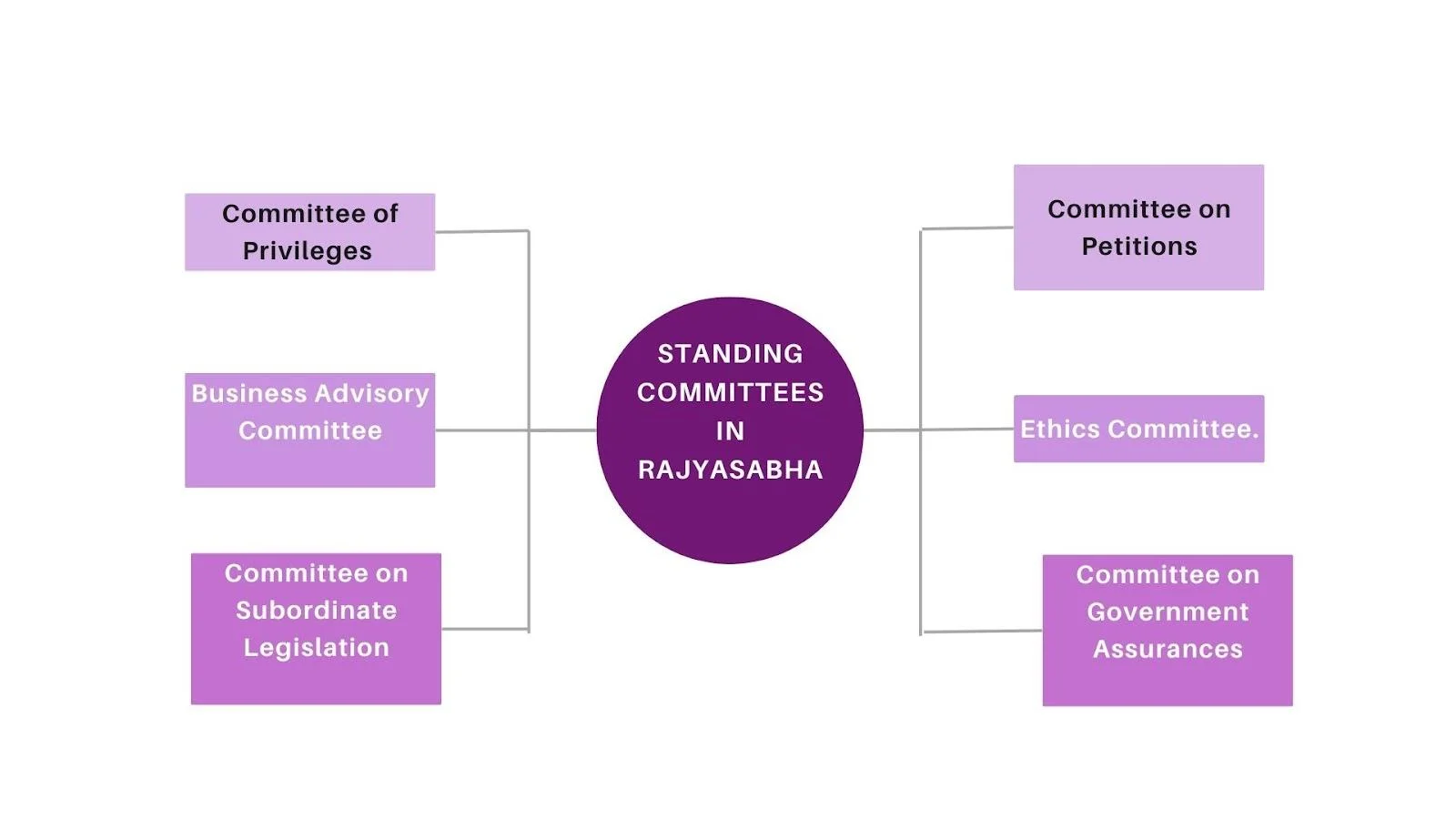
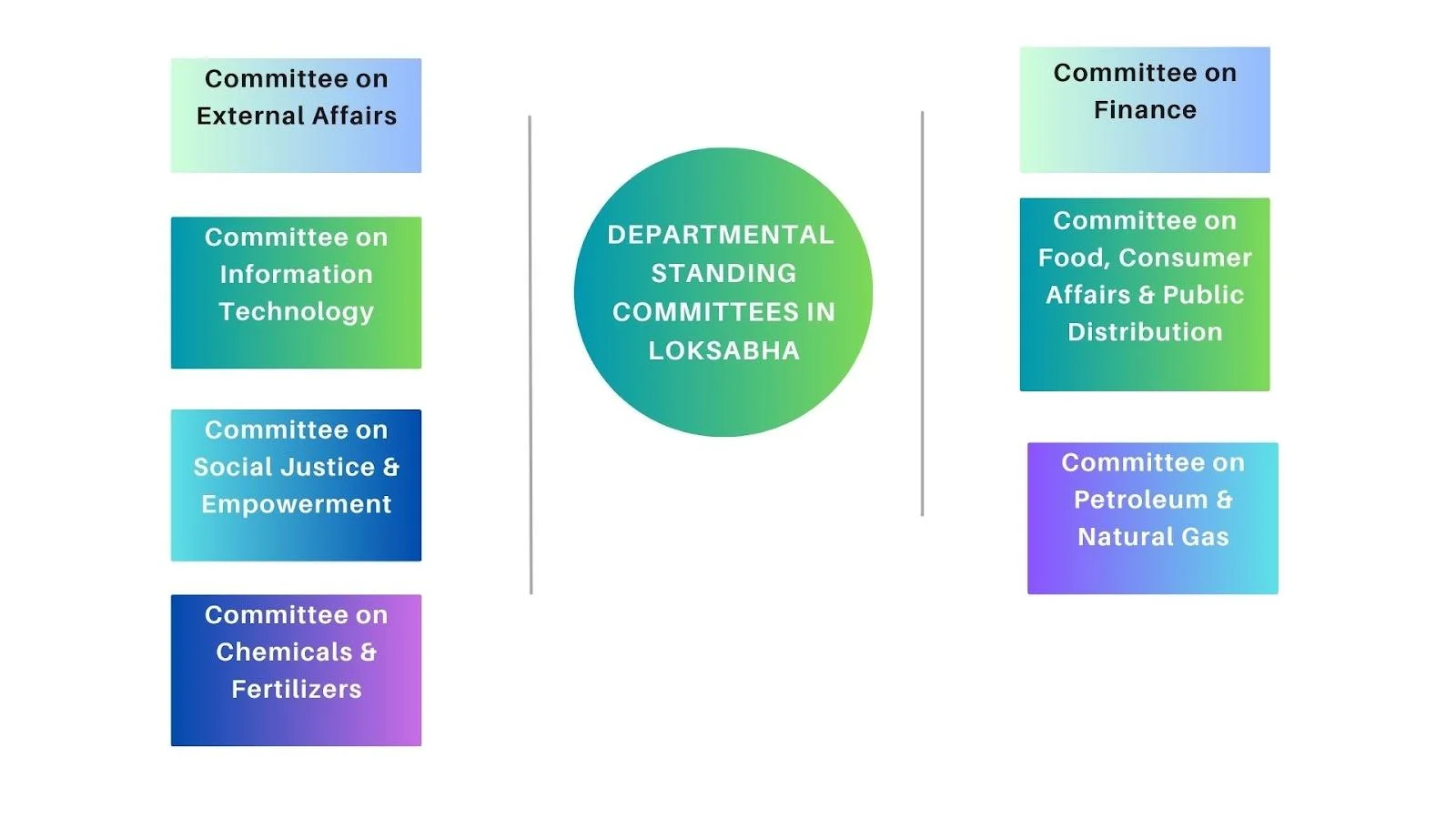
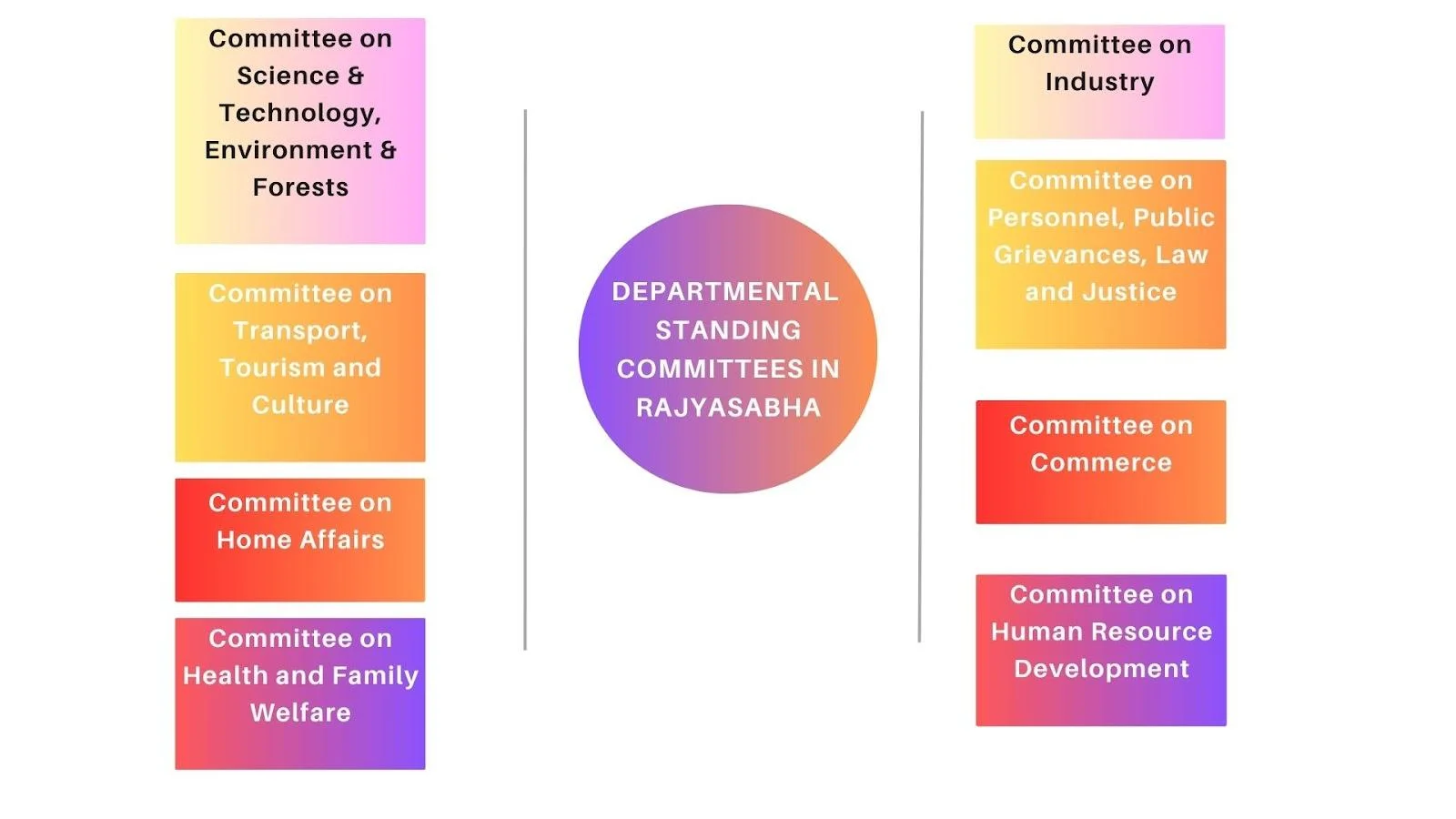
Ad-Hoc Committees
- Occasionally, temporary Ad hoc Committees are established to investigate specific matters.
- These committees are not explicitly named in the Rules of Procedure, and they are disbanded once they have completed their assigned task and submitted their report.
Ad hoc Committees can be categorized into two types
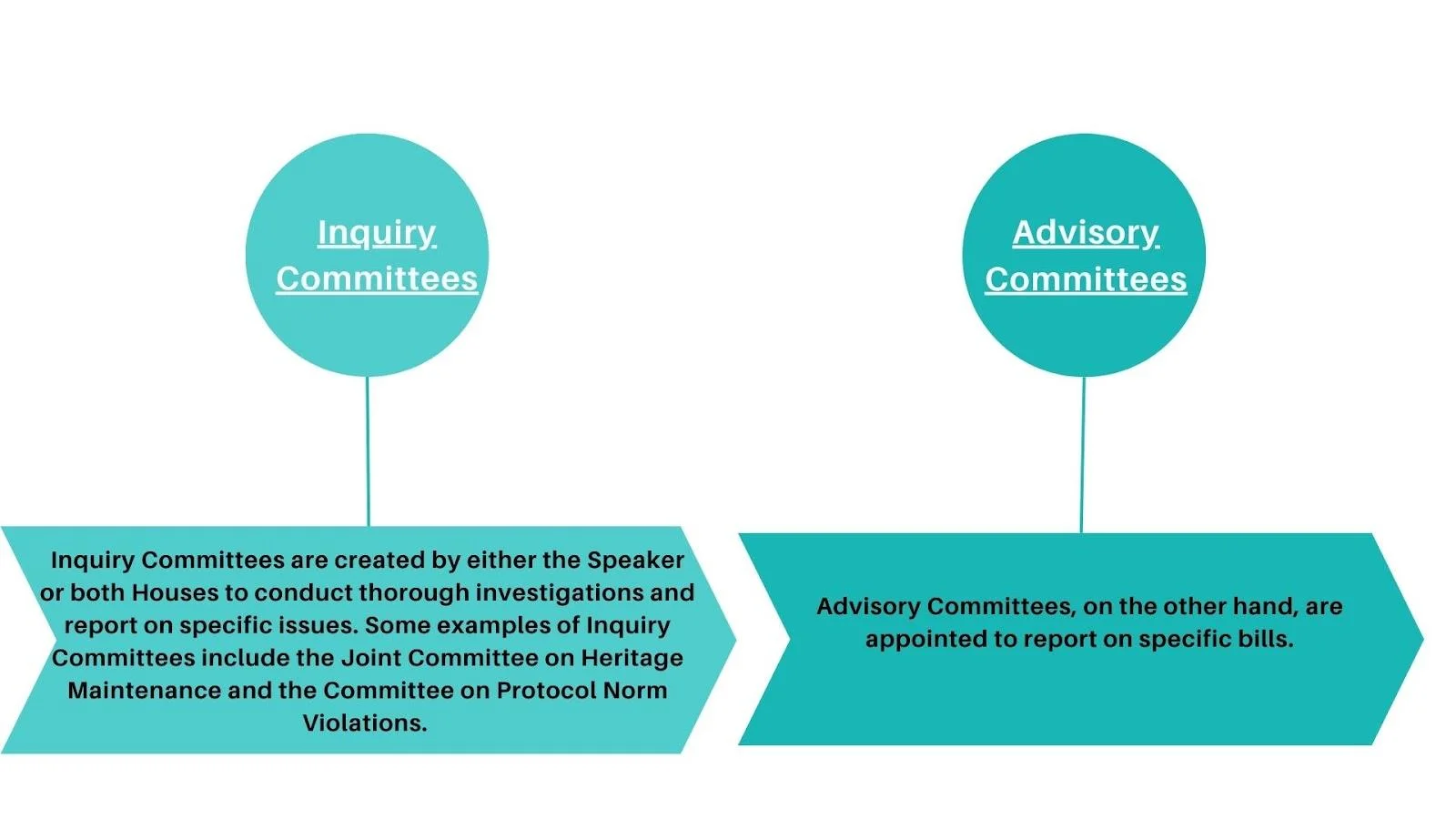
Overview of Ad-Hoc Committees Committees
| Committee Name | Number of Members | Tenure | Nominations |
| Committee on Food Management in PH Complex | 15 (10 LS + 5 RS) | 1 year | Nominated by the Speaker, Lok Sabha and Chairman, Rajya Sabha |
| Committee on Installation of Portraits/Statues of National Leaders and Parliamentarians | 12 (8 LS + 4 RS) | Duration of one Lok Sabha | Same as above |
| Committee on MP Local Area Development Scheme | 24 | 1 year | Same as above |
| Committee on Provision of Computers to Members of Lok Sabha | 10 | Duration of one Lok Sabha | Same as above |
| JPC on Maintenance of Heritage Character and Development of Parliament House Complex | 10 (7 LS + 3 RS) + 4 ex officio members + 1 Special Invitee | Duration of one Lok Sabha | Same as above |
| Joint Committee on Security in PH Complex | 10 (7 LS + 3 RS) | 1 year | Same as above |
| Railway Convention Committee | 18 (12 LS + 6 RS) | Duration of one Lok Sabha | Nominated by the Speaker |
Standing Committees
In the Indian Parliament, six types of standing committees are explicitly defined.
- These include financial committees, departmental standing committees, committees to inquire, committees to scrutinize and control, house-keeping, and service committees.
- Generally the Minister is not part of these committees.
- They are mentioned below:
Financial Committees
Committee on Public Undertakings
- Number of Members: 22 (15 from Lok Sabha + 7 from Rajya Sabha)
- Tenure: 1 year
- Members Nominated or Elected: Elected by both Houses
Estimates Committee
- Number of Members: 30
- Tenure: 1 year
- Members Nominated or Elected: Elected by the Lok Sabha
Public Accounts Committee
- Number of Members: 22 (15 from Lok Sabha + 7 from Rajya Sabha)
- Tenure: 1 year
- Members Nominated or Elected: Elected by both Houses
Departmentally Related Standing Committees (DRSCs)
- There are 24 Departmentally Related Standing Committees, each covering various Ministries/Departments of the Government of India.
- Composition: Each committee consists of 31 members—21 from Lok Sabha and 10 from Rajya Sabha.
- Nominations: Members are nominated by the Speaker of Lok Sabha and the Chairman of Rajya Sabha.
- Tenure: The term of office does not exceed one year.
Other Standing Committees
- Business Advisory Committee
-
-
- Number of Members: 15
- Tenure: Not fixed; can continue in office until reconstituted.
- Members Nominated or Elected: Nominated by the Speaker of Lok Sabha
-
- Committee of Privileges
-
-
- Number of Members: 15
- Tenure: Not fixed; can continue in office until reconstituted.
- Members Nominated or Elected: Nominated by the Speaker of Lok Sabha
-
- Committee on Absence of Members from the Sittings of the House
-
- Number of Members: 15
- Tenure: 1 year
- Members Nominated or Elected: Nominated by the Speaker of Lok Sabha
Enroll now for UPSC Online Course
| Must Read | |
| Current Affairs | Editorial Analysis |
| Upsc Notes | Upsc Blogs |
| NCERT Notes | Free Main Answer Writing |
Conclusion
Parliamentary Committees play a pivotal role in the legislative process, allowing for detailed scrutiny and efficient handling of parliamentary business.
- Their existence ensures that the Parliament can focus on broader legislative and policy issues, while the committees delve into specifics, providing valuable insights and recommendations.
- This division of labor is crucial for the effective functioning of Indian democracy.
Sign up for the PWOnlyIAS Online Course by Physics Wallah and start your journey to IAS success today!
| Related Articles | |
| Leader of Opposition in Lok Sabha | Indian Parliament |
| Article 105: Legislators’ Immunity from Bribery Charges | Parliamentary Committees in India: Structure, Functions, and Importance |

 GS Foundation
GS Foundation Optional Course
Optional Course Combo Courses
Combo Courses Degree Program
Degree Program









